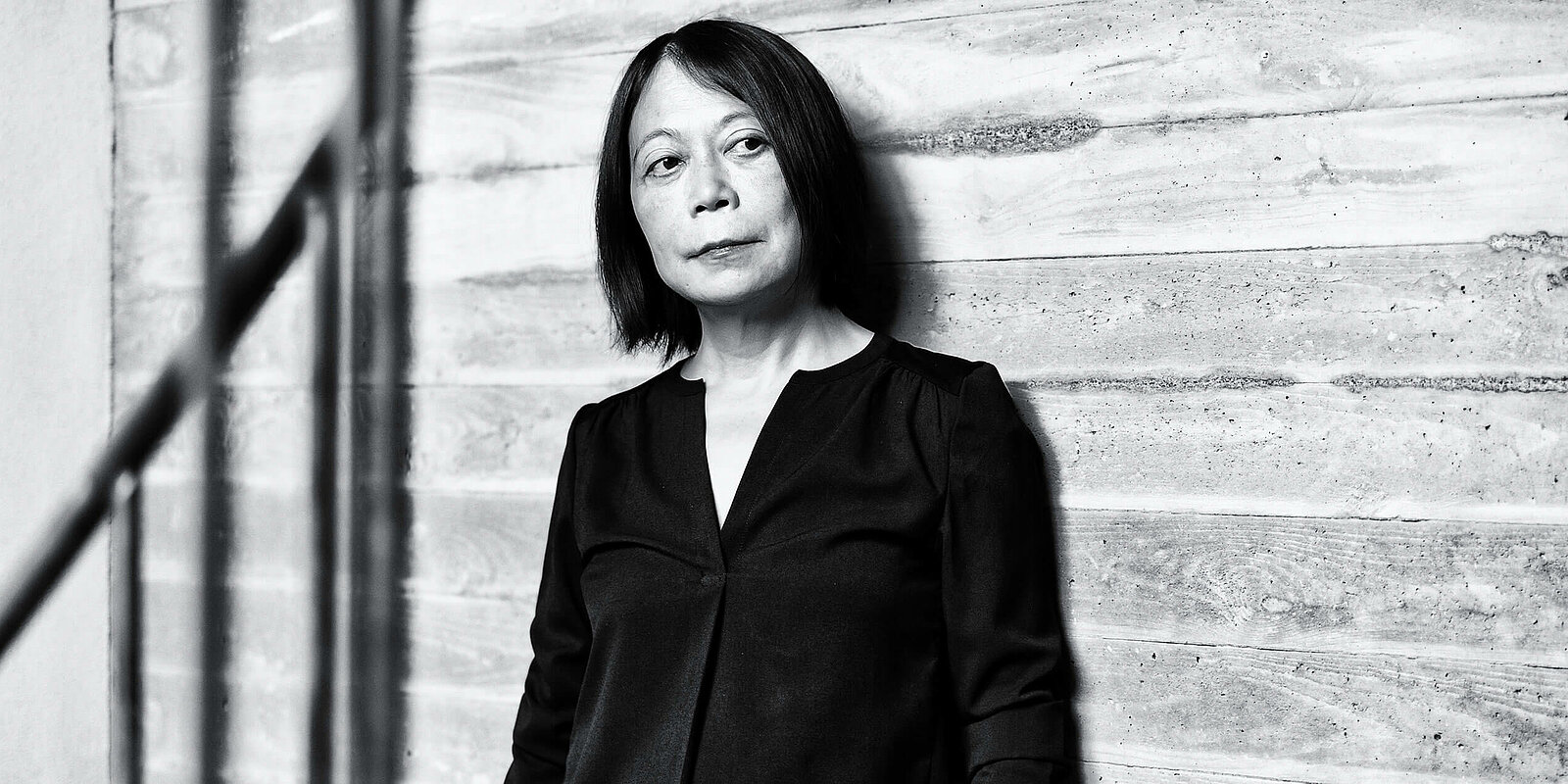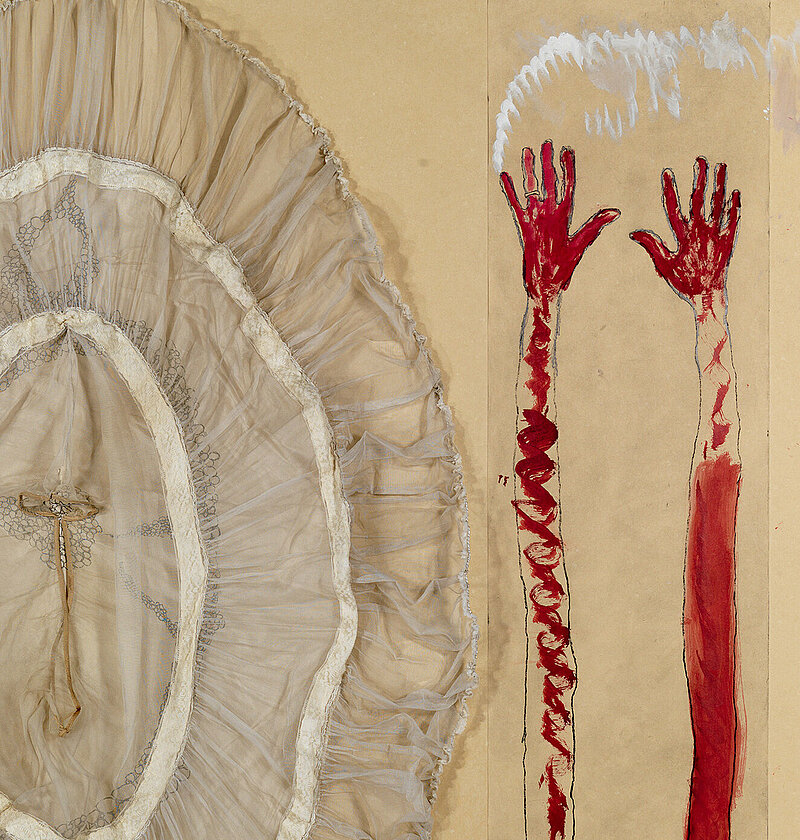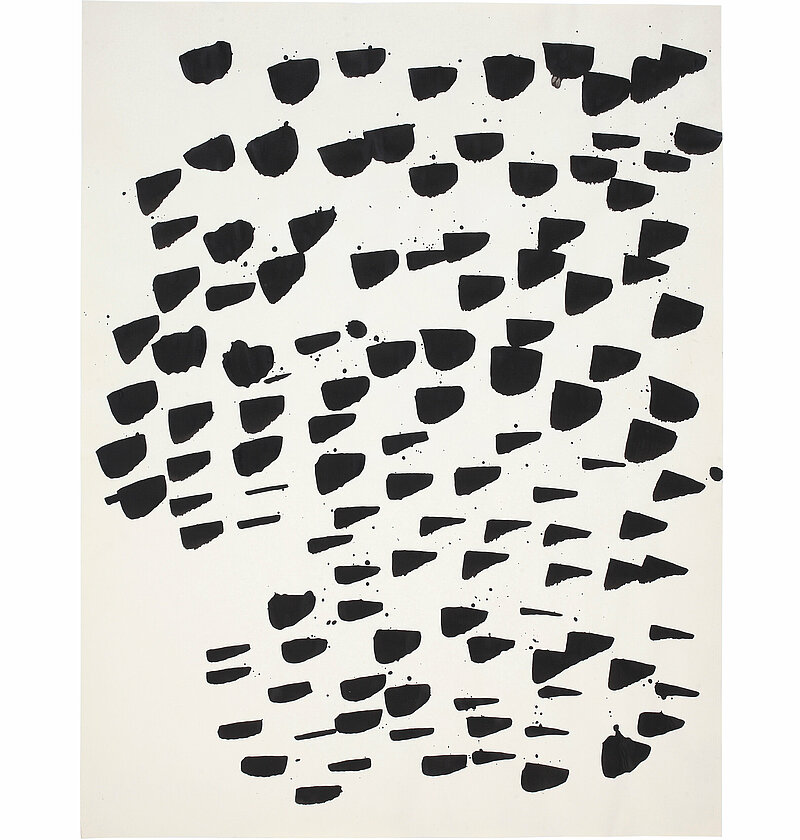
It is often said that Leiko Ikemura’s work is characterised by the encounter of two cultures: it references Western art history, but the themes and formal vocabulary also immerse the beholder in the Japanese tradition, which venerates asymmetry, incompleteness, and ambiguity. “Imagination is the strongest force in my work”, says the artist, and it is precisely this exercise of completing something with one’s imagination that enables the viewer to enter into a dialogue with the Western tradition, which is oriented towards limits, an avoidance of ambiguity, and symmetry. In her art, Ikemura attempts to elude rational control and to immerse herself and the beholder in sensual and emotional experience. The viewer seems to find himself in a kind of intermediate world, in horizontal landscapes with visually unlimited pictorial spaces, or in cosmic landscapes whose forms may be interpreted anthropomorphically - human creatures take on the shapes of animals, or trees or rocks metamorphose into human faces. The transitions are always fluid – in painting and sculpture, in landscape and in human portrayals.
Leiko Ikemura was born in Tsu, Japan. She studied Spanish literature at the University of Foreign Languages in Ōsaka and emigrated to Spain in 1972 to intensify her studies in Salamanca and Granada. From 1973 until 1978 she pursued painting studies at the Academy in Seville. After moving to Switzerland Ikemura left a lasting impression on the Zurich art scene of the Eighties. In 1983, the Bonner Kunstverein dedicated her works a major exhibition. Numerous exhibitions and retrospectives at renowned international institutions followed, the most notable of which being recent shows at Staatliche Kunsthalle, Karlsruhe (2012), Vangi Sculpture Garden Museum, Shizuoka, Japan (2014), Museum of East Asian Art, Cologne, (2015) and Haus am Waldsee, Berlin, 2016.
From 1991 to 2015 she taught at the Universität der Künste, Berlin (UdK, formerly HdK). Since 2014 she is a professor at the Joshibi University of Art and Design, Kanagawa, Japan. Leiko Ikemura lives and works in Berlin and Cologne, Germany.
Exhibitions
Publications
Exhibitions
Albertina Museum, Vienna, Austria
Bündner Kunstmuseum, Chur, Switzerland
Heredium Museum, Daejeon, Korea
Kunsthalle Emden, Germany
Feuerle Collection, Berlin, Germany
Museum de Fundatie Zwolle, Zwolle, The Netherlands
MAZ Museo de Arte Zapopan, Guadalajara, Zapopan, Mexico
Ludes Stiftung, Villa Jacobs Sculpture Park, Machine House and Orangery, Potsdam, Germany
Tsutaya, Kyoto, Japan
Georg Kolbe Museum, Berlin, Germany
Herbert Gerisch-Stiftung, Neumünster, Germany
Puerto Banús, Marbella in conjunction with Ciutat de les Arts I les Ciències, Valencia, Spain
Centro de Arte Caja de Burgos CAB, Burgos, Spain
Ciutat de les Arts I les Ciències, Valencia, Spain
Kunsthalle Rostock, Rostock, Deutschland
St. Matthäuskirche, Berlin, Deutschland
Kunstmuseum Basel, Basel, Schweiz
The National Art Center, Tokyo, Japan
Neue Galerie Gladbeck, Gladbeck, Deutschland
Max Liebermann Haus, Berlin, Deutschland
Neue Galerie Gladbeck, Gladbeck, Deutschland
Max Liebermann Haus, Berlin, Deutschland
Deutsches Keramikmuseum Hetjens, Düsseldorf, Deutschland
Galerie Karsten Greve, Köln, Deutschland
Beck & Eggeling International Fine Art, Wien, Österreich
Deutsches Keramikmuseum Hetjens, Düsseldorf, Deutschland
Galerie Karsten Greve, Köln, Deutschland
Shugo Arts, Tokyo, Japan
Nevada Museum of Art, Reno, NE, USA
Kenji Taki Gallery, Nagoya, Japan
Kunst im Westend, DRK Kliniken Berlin, Westend, Berlin, Deutschland
Haus am Waldsee, Berlin, Deutschland
Galerie Karsten Greve, Paris, Frankreich
Nevada Museum of Art, Reno, NE, USA
Kenji Taki Gallery, Nagoya, Japan
Kunst im Westend, DRK Kliniken Berlin, Westend, Berlin, Deutschland
Haus am Waldsee, Berlin, Deutschland
Galerie Karsten Greve, Paris, Frankreich
Museum für Ostasiatische Kunst, Köln, Deutschland
Haus am Waldsee, Berlin, Deutschland
Galerie Mirchandani + Steinruecke, Mumbai, Indien
Museum für Ostasiatische Kunst, Köln, Deutschland
Haus am Waldsee, Berlin, Deutschland
Galerie Mirchandani + Steinruecke, Mumbai, Indien
Neues Museum Nürnberg, Nürnberg, Deutschland
Vangi Sculpture Garden Museum, Shizuoka, Japan
Museum Sinclair-Haus, Bad Homburg, Deutschland
Hilfiker Kunstprojekte, Luzern, Schweiz
Neues Museum Nürnberg, Nürnberg, Deutschland
Vangi Sculpture Garden Museum, Shizuoka, Japan
Museum Sinclair-Haus, Bad Homburg, Deutschland
Hilfiker Kunstprojekte, Luzern, Schweiz
Galerie Karsten Greve, Köln, Deutschland
Staatliche Kunsthalle Karlsruhe, Karlsruhe, Deutschland
Galerie Karsten Greve, Köln, Deutschland
Staatliche Kunsthalle Karlsruhe, Karlsruhe, Deutschland
Museum für Asiatische Kunst - Staatliche Museen zu Berlin - Museen Dahlem, Berlin, Deutschland
KOLUMBA Erzbischöfliches Diözesanmuseum, Köln, Deutschland
Shugo Arts, Tokyo, Japan
Museum für Asiatische Kunst - Staatliche Museen zu Berlin - Museen Dahlem, Berlin, Deutschland
KOLUMBA Erzbischöfliches Diözesanmuseum, Köln, Deutschland
Shugo Arts, Tokyo, Japan
Galerie Haas AG, Zürich, Schweiz
Galerie Haas AG, Zürich, Schweiz
Kunstmuseum Basel, Basel, Switzerland
Being Art Museum, Shanghai, China
Shandong Art Museum, Jinan, China
Kunstmuseum Basel, Basel, Switzerland
The Vangi Sculpture Garden Museum, Shizuoka, Japan
Villa Schöningen, Potsdam, Germany
Aargauer Kunsthaus, Aarau, Switzerland
Museum für Ostasiatische Kunst, Cologne, Germany
Musée Cantonal des Beaux-Arts, Lausanne, Switzerland
Toyota Municipal Museum of Art, Aichi, Japan
Haus des Papiers, Berlin, Germany
The National Museum of Modern Art, Tokyo, Japan
Kunstraum Villa Friede, Bonn, Germany
Schloss Lieberose, Lieberose, Deutschland
PalaisPopulaire, Berlin, Deutschland
Kühlhaus, Berlin, Deutschland
Kunsthaus Baselland, Basel, Schweiz
Kunstforum Solothurn, Solothurn, Schweiz
Barlach Halle K, Hamburg, Deutschland
Galerie Martina Kaiser, Köln, Deutschland
Tony Wuethrich Galerie, Basel, Schweiz
The Pola Museum of Art, Hakone, Japan
Takamatsu Art Museum, Shikoku, Japan
PalaisPopulaire, Berlin, Deutschland
Kühlhaus, Berlin, Deutschland
Kunsthaus Baselland, Basel, Schweiz
Kunstforum Solothurn, Solothurn, Schweiz
Barlach Halle K, Hamburg, Deutschland
Galerie Martina Kaiser, Köln, Deutschland
Tony Wuethrich Galerie, Basel, Schweiz
The Pola Museum of Art, Hakone, Japan
Takamatsu Art Museum, Shikoku, Japan
Galerie Karsten Greve AG, St. Moritz, Switzerland
Tokyo Station Gallery, Tokyo, Japan
Galerie Karsten Greve, Köln, Deutschland
Tony Wuethrich Galerie, Basel, Schweiz
Galerie Mikael Andersen, Kopenhagen, Dänemark
Forum Kunst Rottweil, Rottweil, Deutschland
Beck & Eggeling International Fine Art, Düsseldorf, Deutschland
Dominikanermuseum, Rottweil, Deutschland
Paula Modersohn-Becker Museum, Bremen, Deutschland
Skulpturenpark Köln, Köln, Deutschland
Bundeskunsthalle, Bonn, Deutschland
Kunstmuseum Ahrenshoop, Ostseebad Ahrenshoop, Deutschland
Galerie Thomas Rehbein, Köln, Deutschland
Sculpture Garden Museum, Mishima, Japan
Bayerische Akademie der Schönen Künste, München, Deutschland
Tokyo Station Gallery, Tokyo, Japan
Galerie Karsten Greve, Köln, Deutschland
Tony Wuethrich Galerie, Basel, Schweiz
Galerie Mikael Andersen, Kopenhagen, Dänemark
Forum Kunst Rottweil, Rottweil, Deutschland
Beck & Eggeling International Fine Art, Düsseldorf, Deutschland
Dominikanermuseum, Rottweil, Deutschland
Paula Modersohn-Becker Museum, Bremen, Deutschland
Skulpturenpark Köln, Köln, Deutschland
Bundeskunsthalle, Bonn, Deutschland
Kunstmuseum Ahrenshoop, Ostseebad Ahrenshoop, Deutschland
Galerie Thomas Rehbein, Köln, Deutschland
Sculpture Garden Museum, Mishima, Japan
Bayerische Akademie der Schönen Künste, München, Deutschland
Arp Museum Bahnhof Rolandseck, Remagen, Deutschland
Vangi Sculpture Garden Museum, Shizouka, Japan
KANEKO, open space for your mind, Omaha, NE, USA
Mie Prefecture Art Museum, Tsu-shi, Japan
Berliner Dom, Berlin, Deutschland
Toyota Municipal Museum of Art, Aichi, Japan
City Museum, Belgrad, Serbien
Heidelberger Kunstverein, Heidelberg, Deutschland
Galerie Karsten Greve, Köln, Deutschland
Kunsten Museum of Modern Art, Aalborg, Dänemark
Arp Museum Bahnhof Rolandseck, Remagen, Deutschland
Vangi Sculpture Garden Museum, Shizouka, Japan
KANEKO, open space for your mind, Omaha, NE, USA
Mie Prefecture Art Museum, Tsu-shi, Japan
Berliner Dom, Berlin, Deutschland
Toyota Municipal Museum of Art, Aichi, Japan
City Museum, Belgrad, Serbien
Heidelberger Kunstverein, Heidelberg, Deutschland
Galerie Karsten Greve, Köln, Deutschland
Kunsten Museum of Modern Art, Aalborg, Dänemark
Ashikaga Museum of Art, Tochigi, Japan
Hiratsuka City Museum of Art, Kanagawa, Japan
Nordiska Akvarellemuseet, Skärhamn, Schweden
Bonnefantenmuseum, Maastricht, Niederlande
Skulpturenpark, Köln, Deutschland
Galerie Karsten Greve, Paris, Frankreich
Rohkunstbau XXI, Schloss Roskow, Roskow, Deutschland
Galerie Isabelle Gounod, Paris, Frankreich
Galerie Karsten Greve AG, St. Moritz, Schweiz
Mie Prefectural Art Museum, Tsu, Japan
Kunstmuseum Liechtenstein, Vaduz, Liechtenstein
Ausstellungshalle Grenchen, Schweiz
KOLUMBA Museum, Köln, Deutschland
Osthaus Museum, Hagen, Deutschland
Hegenbarth Sammlung, Berlin, Deutschland
Couvent des Cordeliers, Châteauroux, Frankreich
Ashikaga Museum of Art, Tochigi, Japan
Hiratsuka City Museum of Art, Kanagawa, Japan
Nordiska Akvarellemuseet, Skärhamn, Schweden
Bonnefantenmuseum, Maastricht, Niederlande
Skulpturenpark, Köln, Deutschland
Galerie Karsten Greve, Paris, Frankreich
Rohkunstbau XXI, Schloss Roskow, Roskow, Deutschland
Galerie Isabelle Gounod, Paris, Frankreich
Galerie Karsten Greve AG, St. Moritz, Schweiz
Mie Prefectural Art Museum, Tsu, Japan
Kunstmuseum Liechtenstein, Vaduz, Liechtenstein
Ausstellungshalle Grenchen, Schweiz
KOLUMBA Museum, Köln, Deutschland
Osthaus Museum, Hagen, Deutschland
Hegenbarth Sammlung, Berlin, Deutschland
Couvent des Cordeliers, Châteauroux, Frankreich
Museum für Ostasiatische Kunst, Köln, Deutschland
The Clarinda Art Museum, Clarinda, IA, USA
Kunsthaus Interlaken, Interlaken, Schweiz
Musée des Beaux-Arts, Libourne, Frankreich
Arp Museum, Rolandseck, Remagen, Deutschland
Galerie Karsten Greve, Köln, Deutschland
Museum für Ostasiatische Kunst, Köln, Deutschland
The Clarinda Art Museum, Clarinda, IA, USA
Kunsthaus Interlaken, Interlaken, Schweiz
Musée des Beaux-Arts, Libourne, Frankreich
Arp Museum, Rolandseck, Remagen, Deutschland
Galerie Karsten Greve, Köln, Deutschland
Villa Wachholtz, Neumünster, Deutschland
Villa Wachholtz, Neumünster, Deutschland
Skulpturenpark, Köln, Deutschland
Berlinische Galerie, Berlin, Deutschland
Kunsthaus Interlaken, Interlaken, Schweiz
Museum of Contemporary Ceramic Art, Shigaraki, Japan
Skulpturenpark, Köln, Deutschland
Berlinische Galerie, Berlin, Deutschland
Kunsthaus Interlaken, Interlaken, Schweiz
Museum of Contemporary Ceramic Art, Shigaraki, Japan
KW Institute for Contemporary Art, Berlin, Deutschland
KW Institute for Contemporary Art, Berlin, Deutschland
Jagla Ausstellungsraum, Köln, Deutschland

![[Translate to English:] [Translate to English:]](/fileadmin/_processed_/4/5/csm_Leiko_Ikemura-aire-GKG_Koeln_2021-Einladungskarte_4ae18a3ee4.jpg)
